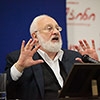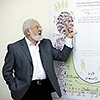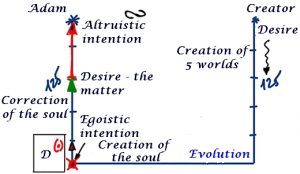Audio Version Of The Blog – 08.14.17
Listen to an Audio Version of the Blog
Download: MP3 Audio

Listen to an Audio Version of the Blog
Download: MP3 Audio
The horrible events in #Charlottesville point to the dire need to bring the American public together. Full post: http://bit.ly/charprotests
From Twitter, 8/13/17
Related Material:
My Thoughts On Twitter, 8/10/17
My Thoughts On Twitter, 8/9/17
My Thoughts On Twitter, 8/7/17
 Question: What is eternal pleasure? How can we enjoy forever?
Question: What is eternal pleasure? How can we enjoy forever?
Answer: Eternal pleasure is a state in which you can constantly renew your desires though your connection with others. This is how you constantly renew the filling in these desires and feel eternal pleasure.
[211077]
From the Kabbalah Lesson in Russian 3/12/17
Related Material:
How Can We Attain Infinite Pleasure?
Where Can We Find The Patent For Eternal Pleasure?
Deficiency And Fulfillment
 Question: Why do we sometimes refer to desire as matter and another time as a force? Can matter be a force? Or does force clothe into matter?
Question: Why do we sometimes refer to desire as matter and another time as a force? Can matter be a force? Or does force clothe into matter?
Answer: Often times we refer to desire as matter because there is nothing other than desire. But the desire is inherent in the force (as much as it desires); that is why we also refer to it as a force.
[210840]
From the Kabbalah Lesson in Russian 3/19/17
Related Material:
What Is Creation?
To Stand Before The Creator And Become Like Him
Why Does The Creator Need Me?
 Question: What are the Creator’s attributes?
Question: What are the Creator’s attributes?
Answer: The Creator is the attribute of absolute goodness, absolute love. The thought of creation is the creation of a created being that can become equal to the Creator, to ascend to His level.
If we had the Creator’s attributes from the start, we would have existed in Him, not feeling that we exist. We have to feel our difference from the Creator in order to simultaneously feel both ourselves and our resemblance to the Creator: what are we and what is the Creator, and all this distance between us is like a sense of distance and contradiction, similarity and equality.
This is the reason that the whole system of creation, which operates on us in order to bring us to the level on which we resemble it, was created by the Creator.
The first thing the Creator created was a desire to receive.
The desire descended from the Creator according to five phases of descent until it reached the level of our world in which the desire develops and evolves and everything in the world is built: the universe, the earth, other planets, and us.
Now we begin to ascend back to the Creator. Eventually we will attain the state in which we become similar to Him and ascend to the His level. This happens in accordance to our ascent though the levels of five worlds or 125 levels.

Question: How have we discovered that our mission actually comes down to the ascent?
Answer: Being in the lowest state, we begin to feel a certain inclination to ascend upward. This inclination is called the point of the heart; it pulls us forward.
From that moment, from the moment the created being begins to feel a desire to ascend, he is considered a human being, Adam, according to his goal because he yearns for the upper point called Adam, which means to resemble the Creator (Domeh).
Thus, the thought of the creation includes five worlds, the descent of the created being downward, the creation of the soul, and finally its correction.
Question: It seems that our evolution should come to an end at a certain point?
Answer: Our evolution will come to an end and it will be quite soon. It is a constantly accelerating process. This is the reason that first space was developed and then the earth and then man. We develop in such a turbulent manner that each day is very different from the next.
The Creator created a desire to receive that develops, descends, and becomes increasingly more egoistic.
Then, when the soul is created, the desire acquires an intention. First, at the lowest point, it is an egoistic intention for my own sake.
Then the desire begins to ascend and it changes the intention to an altruistic one. The desire always changes according to the intention since in itself it is indifferent, it is just matter, all of the matter in nature.
[211002]
From the Kabbalah Lesson in Russian 4/2/17
Related Material:
Two Sides Of The Thought Of Creation
The Ten Sefirot – The Foundation Of The Creation
Revelation Comes Only From The Light
 Question: What sensations are triggered in us by the influence of the upper Light?
Question: What sensations are triggered in us by the influence of the upper Light?
Answer: The influence of the upper Light raises in us the importance of the quality of bestowal, connection with others, and connection with the Creator (which, in principle, are the same thing); that is, we exchange our nature for the upper nature built on the principle “outside of me,” so that I stop being isolated within myself and come out of myself.
[211109]
From the Kabbalah Lesson in Russian, 4/2/2017
Related Material:
How Ohr Makif Works
How Does The Upper Light Work?
The Whole Truth About The Surrounding Light
New Life 866 – The Correction Of The World
Dr. Michael Laitman in conversation with Oren Levi and Yael Leshed-Harel
Why are there different views regarding the essence of the correction of the world? What is the role of mankind in the correction of the world, and what is Kabbalah’s approach to this subject?
The wisdom of Kabbalah describes the foundation of the world, the depth of nature, because first we must know what is corrupt in order to correct it. The correction of the world means the correction of man’s nature.
[208542]
From KabTV’s “New Life 866 – The Correction Of The World,” 6/13/17
Preparation for the Lesson
| [media 1] | [media 2] |
Lesson on the Topic: “Perception of Reality”
| [media 3] | [media 4] |
Writings of Baal HaSulam, “Preface to the Wisdom of Kabbalah,” Item 81
| [media 5] | [media 6] |
Writings of Baal HaSulam, “Preface to The Book of Zohar,” Item 12
| [media 7] | [media 8] |